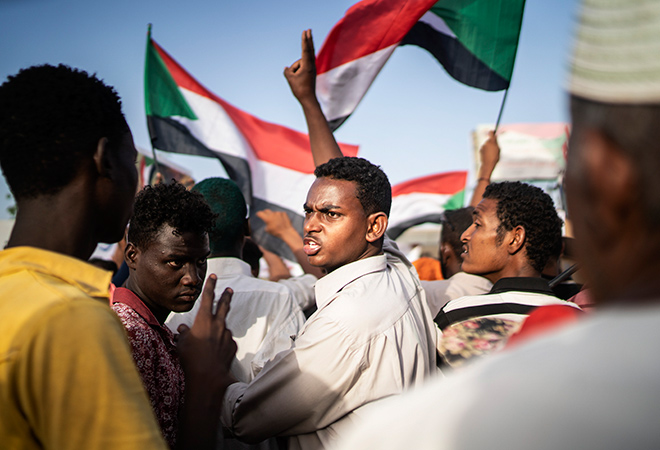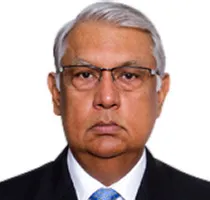-
CENTRES
Progammes & Centres
Location

The domino effect, made famous during the height of the Cold War and the United State’s brutal war in Vietnam, has claimed another Arab dictator. Sudan’s President Omar al-Bashir, in power for 3 decades, has been toppled. Bashir was pushed aside by the Sudanese Army, as public protests intensified and demonstrators gheraoed the Defence Ministry in central Khartoum. The recent toppling of the Algerian dictator Abdel Aziz Bouteflika by people’s power, after months of peaceful protests, seems to have encouraged a copycat uprising by the Sudanese people. The so-called Arab Spring.2 has claimed its second regime.
Sudan became an independent country in 1956 and has seen a series of military coups since then. Bashir, a former military paratrooper, seized power in 1989 in a coup-de ’tat. He has managed to cling to power until now. He faces genocide charges in the International Criminal Court
Bashir’s dictatorial regime was the worst in Sudan’s recent history. His attempt to crush the Christian rebellion in South Sudan failed. His alliance with Islamists, led to the regime’s association with violent jihadis who helped him build militias, to protect his regime and its cronies and fostered massive corruption. He imposed Sharia law and caused disaffection in a country with diverse religious and ethnic composition. The unleashing of the Janjaweed militia on the people of the rebellious province of Darfur, led to his arraignment in the International Criminal Court for extreme human rights abuses.
As far back as 1993, the US designated Sudan as a “state sponsor of terrorism” because it was hosting various terrorist groups, according to the Americans. Among the groups was Al Qaida and Osama bi Laden. The latter had moved to Sudan in 1991 after he fled from Saudi Arabia. From his sanctuary in Sudan, bin Laden organised several terror attacks. In 1996, Sudan was put under UNSC sanctions, after a failed assassination bid on then Egyptian President Hosni Mubarak and harbouring international terrorist groups. Al Qaida members were suspected of bombings of US Embassies in Kenya and Tanzania. Sudan was also accused of supporting insurgencies in neighbouring countries.
Under increased pressure of sanctions, Sudan expelled bin Laden in 1996 who then took refuge in Afghanistan. Sudan also closed Al Qaida bases and expelled their members. UNSC sanctions and international isolation led to a change and since 1999, Sudan started cooperating in the fight against terrorism and led to lifting of some UN sanctions in 2001. By 2007, the USA also eased up on sanctions but continues to maintain American military and economic sanctions
Besieged by domestic problems and international sanctions, Bashir was forced to sign the peace deal in 2011, giving independence to South Sudan which took away three-fourths of Sudan’s oil production. Deprived of oil revenue, Sudan’s economy floundered and the currency had to be devalued in October last year. On the external front, Bashir needled Egypt by siding with Ethiopia over the dam on the Blue Nile which Egypt saw as threat to its water resources. He wooed Saudi Arabia and the UAE by sending troops to Yemen to fight against the Houthis, in return for financial aid. He also sought aid from Qatar, Iran and Turkey and annoyed the Saudis and Emiratis.
The current round of agitation started, in this large, resource rich and strategically located African country, when bread prices were tripled by the government. The initial protests in the Eastern city of Atbara in December last year, snowballed into nationwide demonstration against the government led by President Bashir. While demonstrators have welcomed Bashir’s removal by the Army, they are not willing to obey any curfew or restrictions imposed on them. Pro-Bashir security forces have tried to remove protestors have led to violent confrontations resulting in several deaths. The Army seems to have protected the demonstrators from further attacks.
General Ahmed Awad ibn Auf, the Sudanese Defence Minister and Army Chief, released a public statement saying that Bashir has been removed and placed under house arrest. His statement announced that a Military Council will exercise power for two years after which elections will be held. Meanwhile, political prisoners will be released, a state of emergency and curfew will be imposed. The General has not been above controversy and was head of military intelligence during the conflict in Darfur. He has been Defence Minister since 2015 and also first Vice-President since early this year. The General is clearly unpopular and within 36 hours announced his resignation, under pressure from within the Army and the demonstrators who surrounded the Defence Ministry and demanded that he step down. Lt Gen Abdel Fattah al-Burhan has taken over as head of the transitional council.
The political situation remains fluid and al-Burhan has withdrawn the curfew and has asked each political party to nominate two delegates for a national conference to discuss the future transition to a civilian government. The military council lacks any mandate and the demonstrators remain wary of its intentions, fearing that they the old cabal will continue its hold on power. The demand for handing over power to an independent civilian transitional government has grown stronger by the day. The civil society group that has spearheaded the protests since December last year, the Sudanese Professionals Association
A remarkable feature of the agitation in Sudan has been the role of women who have been at the forefront of protests. Iconic pictures of women leading demonstrators and chanting slogans against Bashir have gone viral on social media. Female volunteers joined hands in preparing food for protestors, preparing over 2000 meals a day. Sudanese women have voiced their anger at their suffering raised their voice in demanding a new Sudan which includes equal share of seats in any civilian transitional government. For Arab Islamic countries such demands breach barriers of religious and social traditions.
Sudan’s economy is in a parlous state. Two wealthy Arab countries, Saudi Arabia and the UAE, together offered USD 3 billion in emergency aid. The protestors, however, spurned the aid offer, suspecting that the offer of aid would be used to leverage and influence the military council. This reaction shows the distrust with which ordinary Sudanese demonstrators view the oil rich Arab countries. The distrust also extends to Lt Gen al-Burhan whose role in sending Sudanese troops to Yemen to help Saudi Arabia fight the Houthi rebels has come under scrutiny. There is little doubt that Sudan needs an injection of aid to deal with economic problems of its 40 million people, struggling with cash shortages and insufficient supplies of basic daily necessities like bread and fuel. Pressure is growing with the African Union
So far, India has not taken a position on the developments in Sudan. Bilateral ties have been cordial since Sudan became independent. Ancient links with Sudan led to trade with India’s Western coast since the end of the 1200 CE. India helped Sudan organize its first elections in 1953 and ensured Sudan’s participation in the Bandung Conference of 1955. Over the years, India has provided humanitarian and technical assistance to Sudan and helped over 30,000 Sudanese students study and obtain University degrees in India. Indian Peace Keeping Forces have been deployed in Sudan, during the sensitive period when South Sudan became independent after years of civil war. Though two-way trade in still under USD 1 billion, Indian investments and Lines of Credit have grown to over USD 3.5 billion, including investments in the oil sector. A relatively small Indian community of around 1500 are permanent residents of Sudan.
The ongoing peaceful “revolution” in Sudan has led to regime change but what kind of regime will assume the reins of the state is still work in progress. The protestors are adamant that the military council hand over power to a selected group of civilians which will conduct elections. There is deep suspicion that the military council may entrench itself in power and Sudan will return to square one. The protestors, led by the SPA, have also rejected foreign intervention, having seen the destruction in Libya, Syria and Yemen. The military and the old elite may still try to hang on to power, though al Burhan has been conciliatory and seemingly open to demands being made by the protestors. It is not clear how the old deep state will behave, using the military council to perpetuate the status quo. A functioning democracy in Sudan appears to be a distant dream as of now.
The author is a Visiting Fellow at Observer Research Foundation, Delhi. He has served as India’s High Commissioner to Bangladesh, Ambassador to Thailand and Secretary in the Ministry of External Affairs, Government of India.
The views expressed above belong to the author(s). ORF research and analyses now available on Telegram! Click here to access our curated content — blogs, longforms and interviews.

Pinak Chakravarty was a Visiting Fellow with ORF's Regional Studies Initiative where he oversees the West Asia Initiative Bangladesh and selected ASEAN-related issues. He joined ...
Read More +